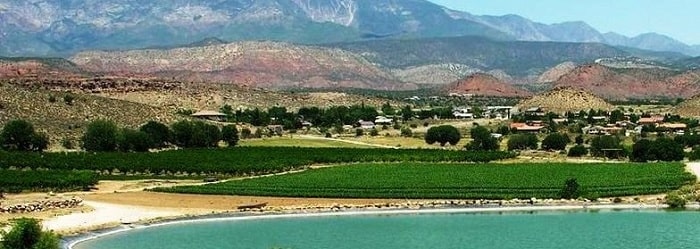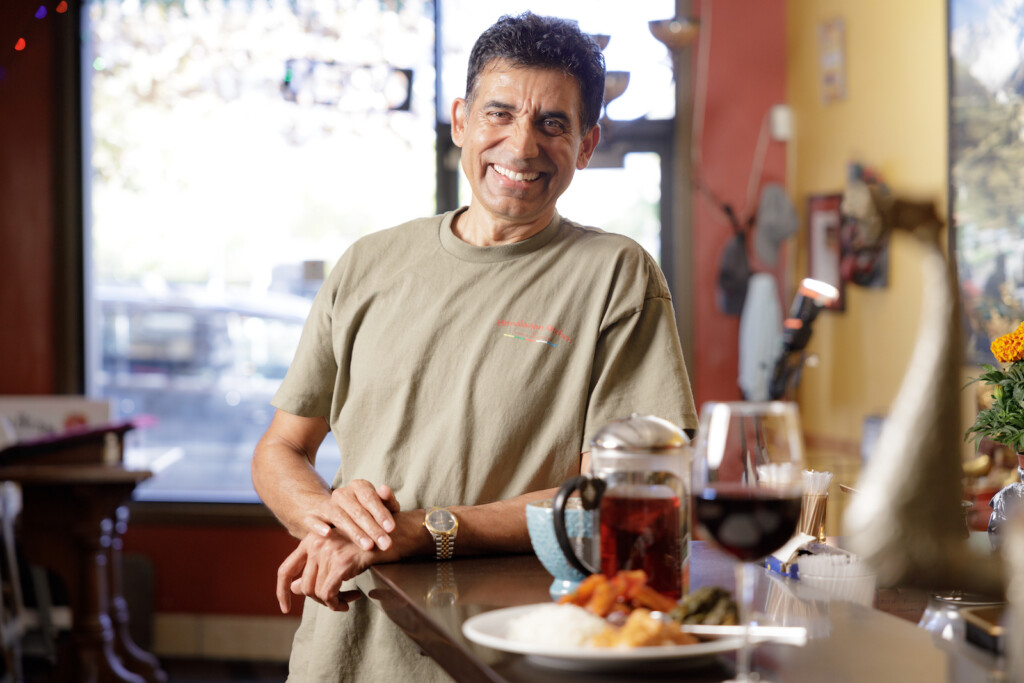
Nestled behind the Sand Hollow Dam and dispersed across Hurricane and Leeds, hundreds of acres yield peaches, watermelon and cantaloupe, along with a variety of other mouth-watering fruits and vegetables. However, these plants don’t grow themselves. Their care comes from the Stirling Fruit & Vegetable Co., which is run by David and Danielle Stirling.
When David took over the family’s fifth-generation farm over 20 years ago, there were only a handful of peach trees, melons and grapevines. Now they span approximately 300 acres. David initially thought that running the farm would be an easy enough task: he expected to spend the majority of his time flying his handcrafted recreational airplanes.
Soon he realized that flying would have to move to the back burner since working the earth took the forefront of his attention and time. David and his family were entirely unaware of the demanding hours required to produce a successful harvest that necessitates waking at four in the morning and not going to bed until at least ten at night.
How did Stirling Fruit & Vegetable become the industry that it is today?
This is the first generation of Stirlings that sells to local stores. They started out by “putting the watermelon and peaches in the back of our truck and peddling the watermelon at the back of stores. We would say, ‘Just taste the watermelon, and see if you like it.’ Everyone who tried one said it tasted incredible. From there, the fruit was unloaded by hand from the back of the trucks … We were crazy.”
Who wouldn’t go crazy from working 110-hour weeks?
Long hours are not the only hardship that attends farming. In recent years, several lettuce and cantaloupe scares have resulted in health complications and even death.
Danielle, David’s wife, explains that some farmers, many of them located near cattle ranches, have not taken sanitary measures seriously enough in the past. “The government has implemented new safety guidelines, which require us to be GlobalG.A.P.+ certified through the USDA. This requires all of the G.A.P. (good agricultural practices) to be done correctly, plus more food safety requirements that take hours and hours to train employees, on top of keeping detailed records, while trying to harvest, sell and transport.”
She emphasized that food safety is Stirling Fruit & Vegetable Co.’s number one priority. “Any farmer that doesn’t prioritize food safety shouldn’t be growing for the general public. Small things done incorrectly can kill thousands of people because of foodborne illnesses.”
While Stirling Fruit & Vegetable Co. is all for practicing food safety, such as ensuring that hands are washed, clean clothes are worn and new gloves are used when harvesting, as well as using clean water from their personal pond to water the crops, it is hard to compete with others who don’t abide by such strict regulations.
Many of the fruits and vegetables that line grocery store shelves these days are shipped from Central America. While this may offer a cheaper alternative to consumers, the reason for this low cost is a lack of regulations among the farms in Central America. “They can grow their produce for pennies and sell it for almost nothing,” Danielle said, “Yet American farmers are punished for trying to keep their buyers safe.”
While farming clearly has its downsides, being able to sell their produce locally has been very beneficial to the Stirling operation. By selling, buying and distributing locally, Danielle noted, “We are keeping the carbon footprint down. If you’re selling local, then it’s staying right in the area. If you’re keeping things local, then it’s like a symbiotic relationship, where everyone is supporting everyone, and it’s getting distributed evenly. If you ship it away, then all of that financial gain for everyone in the community is shipped away and it will never come back.”
Although industrial farming and cheap competition have negatively impacted the Stirlings’ farms, “One business that has impacted our business for the good is Harmons Grocery and Warehouse. They have always represented our product with value and integrity. They have expanded our brand by seeing value in quality and we have increased our quantity in return.”
Considering all the challenges that farming brings, along with unpredictable weather and other uncontrollable variables, it may seem as though working the land for profit is not worth it. Yet David and Danielle continue to farm because of the pleasure that comes from delivering satisfaction to their customers. Danielle recalls hearing from a local produce buyer, who told her that “‘We won’t buy any other watermelons until yours come out.’”
David adds, “Or they’ll come back year after year for peaches, and they’ll say, ‘I’ve been doing this for 17 years. We love it!’”
David and Danielle plan to pass down the farm to the family’s sixth generation, which includes their own children, making it possible for us to enjoy the goods from Stirling Fruit & Vegetable Co. for years to come.





